|
According to a recent news report, the Minister of Higher Education, Blade Nzimande, is considering a legal review of the governance frameworks at South Africa’s universities in order to stem the rising tide of corruption and mismanagement at these institutions. Professor Parmi Natesan, CEO of the Institute of Directors in South Africa (IoDSA) says that the Department can rely on King IV to help him put the necessary governance reforms in place.
“King IV was drafted to be applicable to all types of organisations. Because it is outcomes-based, King IV is flexible—it’s not about following a rigid template but rather taking appropriate actions that will lead to the desired end results,” she says. “While it’s a voluntary code, it is considered governance best practice and it would thus make sense for the Minister to rely on it to guide his actions in reforming governance in the university space. The Department’s own ‘Guidelines for Good Governance Practice’ is also an excellent resource.” The Minister is reported as being particularly concerned about several issues that have repeatedly cropped up in university assessors’ reports. Professor Natesan makes the following comments on these specific areas of concern: Lack of skills and experience of members of university councils. Lack of skill and experience, especially as regards governance best practice and serving as a director, is one that affects many organisations, especially in the public sector. The IoDSA has long since identified the need to build up a talent pool of professional directors who combine their existing sector knowledge and experience with a comprehensive set of directorial competencies. The Institute developed a Director Competency Framework to help the public understand what is needed to serve as a director, and to help prospective directors acquire and maintain these skills via its training programmes. It has also created two SAQA-recognised professional designations for directors. Individuals guilty of transgressions at one university find employment at others. As the ultimate governance custodian, the university council has to ensure that succession planning for senior roles is in place, and that a transparent nominations and thorough due-diligence process is developed and mandated. This due diligence should delve into candidate’s prior track record and reputation prior to appointment. Entrenchment of corruption. Principle 1 of King IV (“The governing body should lead ethically and effectively“) makes it clear that the university council should take collective responsibility for the university’s overall performance and must be held accountable for the execution of its responsibilities. As regards corruption, particularly in the university’s supply chain, it is clearly the council’s responsibility to ensure that effective checks and balances are in place, and are constantly monitored. The council should clearly set the tone of the organisation, which should include zero tolerance for unethical behaviour. “Effective governance is the surest bulwark against corruption and ultimately poor performance, so this should be seen as an urgent and critical matter,” she says. “As the owner of the King Reports and advocate for governance, the IoDSA stands ready to assist the Department with recommendations if needed.” ENDS MEDIA CONTACT: Stephné du Toit, [email protected], 084 587 9933, www.atthatpoint.co.za For more information on the IoDSA please visit: Website: www.iodsa.co.za Twitter: @The_IoDSA LinkedIn: Institute of Directors South Africa Company Page Facebook: Institute of Directors South Africa
0 Comments
The Institute of Directors in South Africa (IoDSA) has been named Most Innovative Corporate Governance Training Institute for 2023 (UK) by Global Brands magazine. Sherma Malan, Executive Director: Certification and Member Services at the IoDSA, says the award is a welcome recognition of the quality of training the Institute offers, and thus its contribution to creating and expanding the country’s directorial talent pool.
“We are particularly proud of our designation as an innovative training provider because we have put so much effort into offering directors and would-be directors training that really does prepare them for what has become a very fast-moving and demanding profession,” she says. “The IoDSA is 60 years old, but that legacy is built on our forward-looking stance. As the ultimate custodians of corporate governance within an organisation, directors have an incredibly tough job and a heavy responsibility—it’s up to us to ensure they can access the best possible training to prepare them for their important role.” The IoDSA is the only professional body for directors in South Africa that is recognised by the South African Qualifications Authority, which means that its training not only meets stringent quality controls but can also earn delegates CPD (continuous professional development points). The IoDSA has been spearheading the professionalisation of directorship in response to the key role directors play in guiding organisations to success, and their potential exposure to personal liability for breaching their fiduciary duties. The IoDSA has introduced two professional director designations, Certified Director and Chartered Director, to provide an objective, rigorous framework within which directors can obtain and maintain the necessary corporate governance skills, aligned with the IoDSA’s Director Competency Framework. Malan says that as a non-profit, the IoDSA can plough all its profits back into the organisation, ensuring it maintains standards and can play a significant role in advocating for corporate governance and directorship in South Africa. It also owns the King Report on Corporate Governance for South Africa, and provides secretarial services to the King Committee. The King Reports are recognised as global standard bearers for corporate governance. An important differentiator for the IoDSA’s director training is that it is provided by a world-class faculty that comprises only serving directors with local and international board experience. The majority of the faculty are Chartered Directors. “As the Zondo Commission’s reports clearly showed, directors are in the frontline of the fight against corruption, and an organisation’s performance directly correlates to the quality of its board,” Malan concludes. “The IoDSA’s training and its Directorship Competency Framework, along with its two professional designations, offer directors and would-be directors with the best possible training to achieve their potential.” ENDS MEDIA CONTACT: Stephné du Toit, [email protected], 084 587 9933, www.atthatpoint.co.za For more information on the IoDSA please visit: Website: www.iodsa.co.za Twitter: @The_IoDSA LinkedIn: Institute of Directors South Africa Company Page Facebook: Institute of Directors South Africa 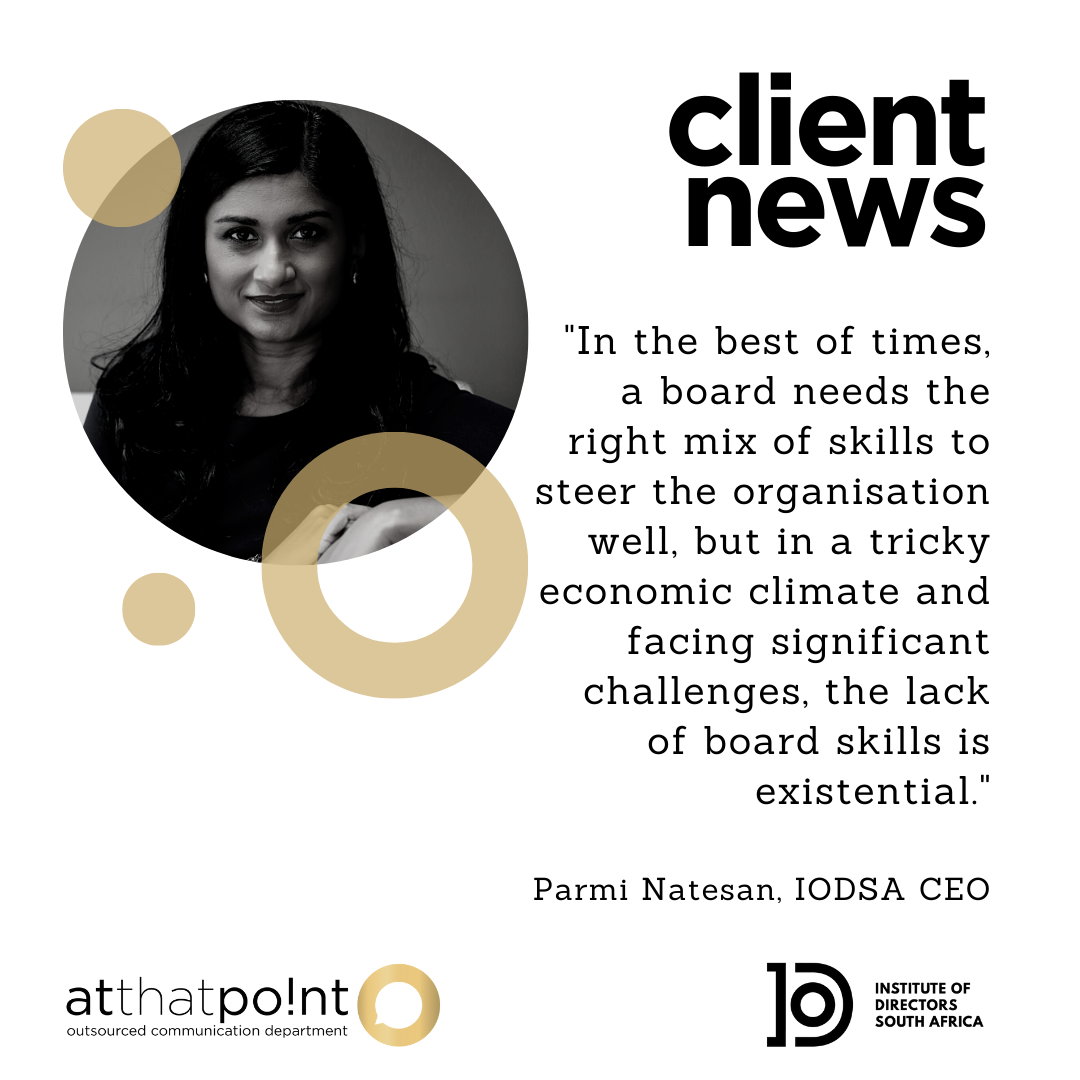 Futuregrowth Asset Management recently raised concerns about the inordinate time it is taking to fill six vacant positions on the Transnet board. These concerns are valid and point to governance issues that should be seriously considered by all boards, says Parmi Natesan, CEO, Institute of Directors in South Africa (IoDSA). “Futuregrowth’s analysis shows that the failure to fill six vacancies in a 12-person board has made it less able to tackle the serious challenges the company faces—a matter of considerable concern given its pivotal role in our economy,” she points out. “In the best of times, a board needs the right mix of skills to steer the organisation well, but in a tricky economic climate and facing significant challenges, the lack of board skills is existential.” For a start, Transnet’s sparsely populated board table means that important board committees like the audit committee, social and ethics committee, and risk committee could be missing critical skills. These committees fulfil vital roles in the governance of the organisation, and particularly in relation to its ability to rise to the challenges it faces. “Organisations and board chairs must pay particular attention to the need for the board to have, in the words of King IV, ‘the appropriate balance of knowledge, skills, experience, diversity and independence for it to discharge its governance role and responsibilities objectively and effectively’ (Principle 7),” Natesan says. A related issue is the fact that the terms of office of the six remaining non-executive directors will expire in May 2024. While the principle of rotating board members in a staggered fashion to ensure that skills are renewed and diversity improved is a good one, it is clearly counterproductive for so many board members to leave at once. “We see this kind of mass reshuffling of boards particularly in the public sector. The motivation behind rotation is good, but it needs to be handled intelligently to ensure that invaluable institutional memory is not lost,” she says. “Organisations need to focus on striking a balance between continuity and renewal.” Another important consideration is succession planning. If board members are going to be rotated regularly, as best practice suggests, then the organisation needs to ensure that individuals with the right skills—including professional directorial skills—are ready in the wings. Succession planning thus needs to proceed in parallel with an ongoing skills audit to ensure that the board understands what skills it needs, and that the individuals nominated for it have them. “Nobody in South Africa at least now doubts the important role that governance and oversight play in ensuring organisational health and effectiveness,” Natesan sums up. “The corollary—that the board needs to have the right mix of skills in order to fulfil this vital function—is equally true. ENDS MEDIA CONTACT: Stephné du Toit, [email protected], 084 587 9933, www.atthatpoint.co.za For more information on the IoDSA please visit: Website: www.iodsa.co.za Twitter: @The_IoDSA LinkedIn: Institute of Directors South Africa Company Page Facebook: Institute of Directors South Africa Much has changed since King IV came into effect on 1 April 2017 but, says the chair of the King Committee, Ansie Ramalho, its principles and practices are expressed at a sufficiently high level of generality to empower boards to apply them in the current circumstances.
“There have been a number of developments in the past few years that will influence how organisations are led and governed over the next decade and beyond,” says Ramalho. “We are currently reflecting on these developments and what they mean for corporate governance, and whether additional clarity or guidance might be required. At this stage, though, we believe that any update of King IV would be premature—especially given the ongoing developments relating to global reporting requirements and standards, as well as the pending Companies Act Amendment Bill.” One of the developments currently being debated by the King Committee is recent rapid advances in artificial intelligence and technology generally, which raise significant, complex risks and ethical issues. At a global level, regulations and standards that deal with sustainability disclosure by companies are also being introduced at an unprecedented speed. Environmental, social and governance (ESG) issues are re-emphasising the focus on the organisation’s purpose and are affecting corporate reporting and disclosure significantly. Human capital governance has become more complex as a new generation of employees enters the corporate world with a novel set of expectations, while the way organisations are run has changed significantly as working habits change in response to the COVID-19 lockdowns. Board composition is also a developing area, with consideration being given to greater stakeholder representation or other suitable mechanisms to enrich decision-making. In the South African context, the Companies Act Amendment Bill looks set to introduce significant amendments to the current Act. The Bill was issued for public comment in 2021, but no final version has yet appeared. However, its proposed provisions for strengthening oversight by social and ethics committees of companies’ social and environmental performance, its introduction of accountability mechanisms for the wage gap, and shareholder voting on remuneration are all clear signals of the prevailing mood, as is the cautionary statement in the Bill’s explanatory memorandum that regulation to include employees in governance structures is to follow. In the wake of the Zondo reports, the country’s greylisting and current geo-political concerns, South African organisations are particularly affected by governance issues relating to corruption, including money laundering, terrorism, and transparency regarding the true owners of a company. King IV unequivocally maintains that operating context needs to be accounted for in strategy development, risk management, performance and reward systems and reporting, but the balancing act is becoming increasingly difficult, says Ramalho. Businesses are increasingly being expected not only to mitigate external risks but to contribute proactively to not only the economies in which they operate but also the health of society and the planet. The move to incorporate ESG factors into investment decisions shows that so-called “non-financial” factors ultimately have financial consequences. Investors are increasingly taking into account the context in which a company operates. This balancing act between financial and non-financial factors is particularly difficult for South African companies. In the interests of their own survival, they are increasingly having to step into gaps created by the government’s inability to deliver key services. To attract investment, South African companies will need to demonstrate that they are able to survive in an overall environment which is fraught with threats and vulnerabilities, Ramalho believes. “I would like to assure all our stakeholders that the King Committee is keeping abreast of the evolving corporate governance trends and has been considering their potential impact on the King IV Report. While any formal update is premature at this stage, we stand ready to offer South African organisations any further insights or guidance that may be required as these trends unfold. We also envisage that this process will include stakeholder engagement,” she says. “The King Committee reaffirms its belief that corporate governance does not exist for its own sake, but as a way of building resilient and healthy companies that are fit for this complex operating context.” ENDS MEDIA CONTACT: Stephné du Toit, [email protected], 084 587 9933, www.atthatpoint.co.za For more information on the IoDSA please visit: Website: www.iodsa.co.za Twitter: @The_IoDSA LinkedIn: Institute of Directors South Africa Company Page Facebook: Institute of Directors South Africa 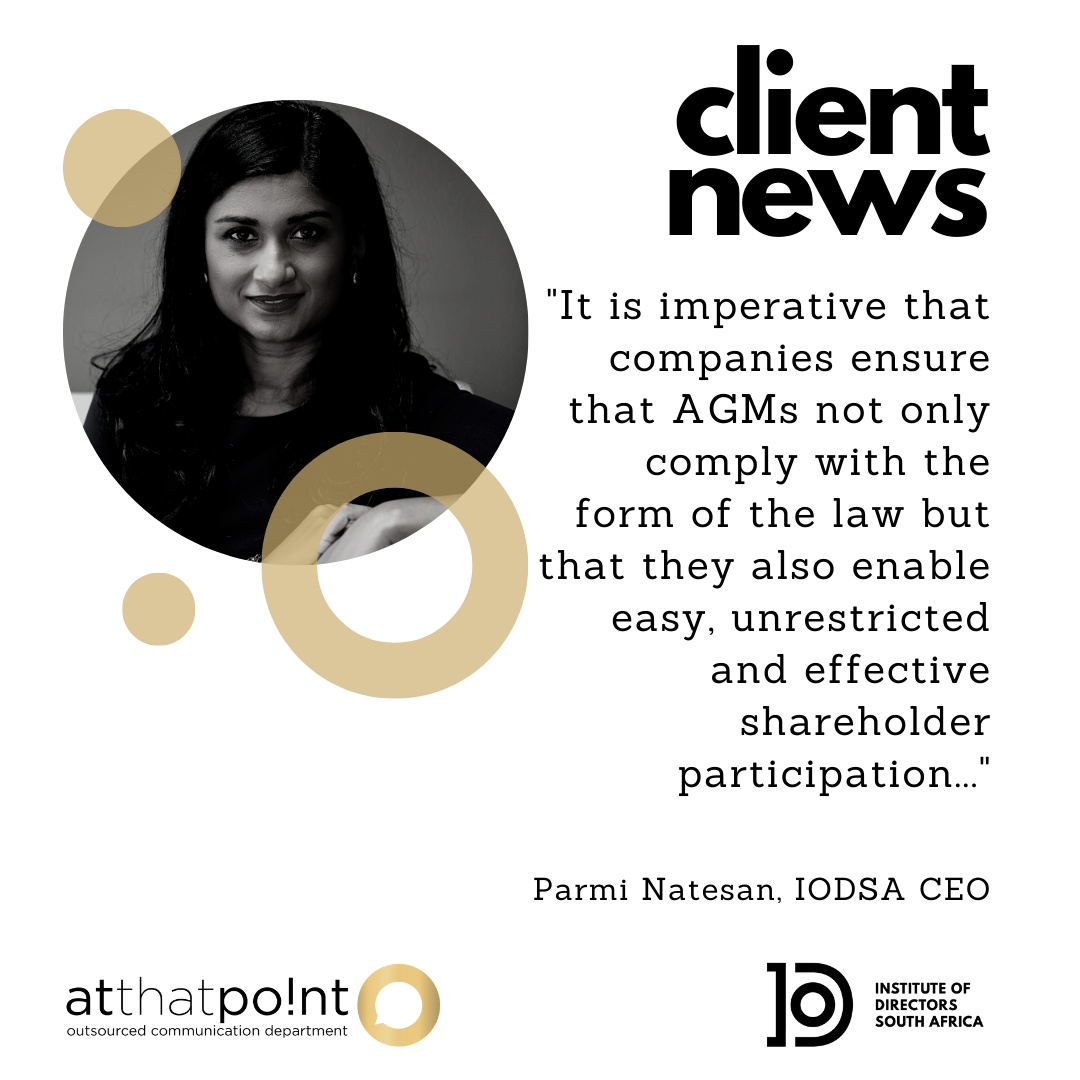 An Annual General Meeting (AGM) of a company that restricts shareholders to use only text-based communication does not constitute an AGM for the purposes of the Companies Act 71 of 2008. This is according to the legal opinion of the Companies and Intellectual Property Commission (CIPC) on holding AGMs via electronic means. According to the opinion, a company holding an AGM with shareholders attending online must allow those shareholders to verbally ask questions in real-time and without an intermediary. This aligns with the IoDSA’s previous comments on this matter, in which we noted that whilst the section does not specifically state that verbal communication is required, the spirit of the section should be interpreted to allow sufficient engagement at the AGM, as would have taken place had the meeting taken place in-person. The Institute of Directors in South Africa (IoDSA) welcomes this clarification from the CIPC. “If you consider the Companies Act and King IV in substance over form, shareholders should have a right to be heard at an AGMs,” says Parmi Natesan, CEO of the IoDSA. “It is imperative that companies ensure that AGMs not only comply with the form of the law but that they also enable easy, unrestricted and effective shareholder participation during the meetings, in substance.” “Whilst engagement between companies and shareholders can take place at any time, the AGM is the key point of formal engagement and the main opportunity for shareholders to exercise their voting rights, raise concerns and ask questions,” explains Natesan. A key, but often neglected voting resolution at AGMs is the appointment of directors. Shareholders have the legal right and obligation to appoint directors to oversee the company. Those directors, in turn, have a legal obligation to act in the company’s best interests and can be held personally liable if they do not do so. A big emphasis at AGMs should therefore be ensuring that the right people are appointed to the board and that they are held properly accountable. Shareholders need to be confident that they are appointing directors in whom they have full trust. They then need to allow these directors to exercise their discretion in the fulfilment of their duties while holding those directors accountable. They should also consider when the removal of a director is appropriate as this is another powerful and important tool that a shareholder has to protect the company’s interests. In relation to the AGM resolution on director appointments, questions asked should therefore be aimed at determining whether board members have the necessary knowledge, skills, experience, independence, personal competencies, track record and even sufficient time available to effectively serve on the board. “In summary, shareholders now have confirmation of their right to be heard at virtual AGMs and are encouraged to use their voice effectively in exercising their voting rights and holding the directors accountable,” says Natesan. ENDS MEDIA CONTACT: Stephné du Toit, [email protected], 084 587 9933, www.atthatpoint.co.za For more information on the IoDSA please visit: Website: www.iodsa.co.za Twitter: @The_IoDSA LinkedIn: Institute of Directors South Africa Company Page Facebook: Institute of Directors South Afric The move by the Tourism Minister, Patricia de Lille, to dismiss the board of South African Tourism has been well received in most quarters. Reasons for the board’s axing apparently centred on the Tottenham Hotspur sponsorship scandal, a spate of board resignations and allegations of sustained sexual harassment by board members. Minister De Lille in addition specifically cited concerns about the composition of the board and the skills, competence and qualifications of its members as reasons for her decision.
“The tourism minister puts her finger on an important issue that should be at the forefront when any board member is appointed. It’s vital that there is a clear understanding first of what skills the board needs, and then ensuring that the specific individuals appointed actually possess those skills,” says Vikeshni Vandayar, Executive: Governance and Corporate Services at the Institute of Directors in South Africa (IoDSA). “In addition, the due-diligence exercise must ascertain whether the prospective director is a fit and proper person to serve on the board—as the Zondo Commission showed us once and for all, an ethical approach is critical to a board’s ability to discharge its fiduciary duties.” The IoDSA has always emphasised the need for nominations committees to undertake comprehensive due diligence of prospective board appointees—and for prospective appointees to do their own due diligence of the organisation and its bona fides. The latter should not be ignored because board members assume personal risks through association with an organisation, and so need to be sure that its governance procedures, financial management, and strategic aims and objectives are aligned with their own. In its guidance paper on “Governing Body Member Due Diligence”, the IoDSA also raises the issue of board members appointed by stakeholders such as empowerment partners, unions, communities and so on. The challenge here is that these appointments are effectively made by a third party, and so there needs to be agreement that the board’s needs in terms of skills and personal qualities are taken into account. Organisations need to be able to contest the appointment of a director by a stakeholder organisation in terms of the desired criteria, the IoDSA says. It also advocates the signing of a mutually binding non-disclosure agreement given that the due-diligence process necessarily involves the sharing of sensitive information. “The members of a board or any other governing body have a vital governance role to play and the success of the organisation hinges on their ability to do so. Principle 7 of King IV stipulates that governing bodies should have ‘the appropriate balance of knowledge, skills, experience, diversity and independence’, and a rigorous process to ensure that members are chosen with this in mind,” Vandayar concludes. ENDS MEDIA CONTACT: Stephné du Toit, [email protected], 084 587 9933, www.atthatpoint.co.za For more information on the IoDSA please visit: Website: www.iodsa.co.za Twitter: @The_IoDSA LinkedIn: Institute of Directors South Africa Company Page Facebook: Institute of Directors South Africa A recent editorial in Business Day raised a perennial governance hot potato: just how many boards should a single individual be able to serve on? The tenor of the article was that the current chair of Capitec should focus on that role, and risked being distracted by chairing two other boards as well.
“The view that the more complex and large an institution is, the more time the chair or board member should have to devote to it has some merit,” says Parmi Natesan, CEO, the Institute of Directors in South Africa. “For example, the decision by the current chair of Eskom to resign as chair of a large bank to concentrate on leading the power utility’s board was probably a wise move. “However, because organisations are of varying sizes and degrees of complexity, and individuals have different capacities, the IoDSA does not believe it makes sense to attempt to create a hard-and-fast rule about how many boards an individual should be able to chair or, indeed, sit on.” She argues that it remains up to each organisation to determine how much time each board member’s role requires, and to ensure that current or prospective board members can commit to that. The individual director’s ability, experience and capacity would also be factors to consider. In addition, board chairs and directors (especially those serving on key board committees) need to have the flexibility to ramp up the time they devote to their work during periods of crisis. Individuals who are fully committed will not have that flexibility. In view of the growing realisation that governance plays a crucial role in ensuring corporate sustainability, investors are starting to take note of how many boards non-executive directors serve on. In the United Kingdom and United States, institutional investors (often via proxy services) oppose the appointment of directors with more than five board seats. In India, by contrast, the legal limit of directorships is 20. King IV addresses the problem by recommending transparency, advising independent non-executive directors to detail their other board commitments and to provide a written undertaking that they have enough time to discharge their board responsibilities (Principle 7, Recommended Practice 18). “Given the importance of the director’s role, it might make sense for boards to formalise the minimum amount of time that each role requires. The overriding principle is that the issue needs to be thoroughly ventilated and minuted to ensure there is consensus about what the role demands, and whether each director can give the time needed,” she concludes. “The Nominations Committee also plays a key role in monitoring the attendance and involvement of board members, and should act swiftly where there are capacity concerns.” ENDS MEDIA CONTACT: Stephné du Toit, [email protected], 084 587 9933, www.atthatpoint.co.za For more information on the IoDSA please visit: Website: www.iodsa.co.za Twitter: @The_IoDSA LinkedIn: Institute of Directors South Africa Company Page Facebook: Institute of Directors South Africa  Just days after Mpho Phalaatse was removed as Johannesburg’s mayor, a letter to all municipal entities surfaced on social media, in which the Acting City Manager of Johannesburg instructs the boards of municipal entities to cease holding any “strategic sessions, including the [sic] Board and Sub-Committee meetings” until further notice. Boards may seek permission to hold meetings to consider any critical reports. All strategic and programme management decisions are specifically placed in abeyance, and any decisions taken since September 2022 are also put on ice. “If this letter is indeed legitimate, it’s hard not to see this move as a departure from good governance. The content of the letter also raises once again all the accountability issues that the IoDSA has consistently highlighted in relation to state- and municipality-owned entities,” says Parmi Natesan, CEO, Institute of Directors in South Africa (IoDSA). “The shareholder may appoint the boards of these entities, but once appointed these boards have a legal duty to fulfil their obligations as set out in the relevant legislation and in the King Report, and to act in the best interests of the entity.” The IoDSA has repeatedly pointed out that many of the issues that plague state- and municipality-owned entities can be traced back to the improper exercise of power by the shareholder. By usurping what should properly be the functions of the board, the shareholder makes it impossible for the board to be held accountable, or for the board to hold management accountable. “Boards are supposed to act independently, but this letter clearly demonstrates that, in the City of Johannesburg at least, they are being prevented from doing so,” she says. Ms Natesan goes on to point out that forbidding the boards of the municipal entities to meet means that they cannot fulfil their duties and exercise oversight properly. “Municipalities are commonly known for lack of service delivery, as well as fruitless and wasteful expenditure, so preventing boards and audit committees, from meeting and thus exercising oversight, will potentially open the door to even more of the same,” she comments. It is questionable whether any appointed board can be prevented from discharging its legal duties. Time will tell whether such action will stand up to scrutiny and legal challenge. “King IV makes it clear that boards should hold as many meetings as necessary to discharge their obligations, so presumably they cannot be prevented from doing that,” she concludes. “This gross interference in the board’s exercise of its governance function is a terrible way for the City’s new administration to begin. The IoDSA urges the new mayor and his executive to take speedy action to confirm their adherence to the principles of good governance as outlined in the legislation and King IV.” ENDS MEDIA CONTACT: Stephné du Toit, [email protected], 084 587 9933, www.atthatpoint.co.za For more information on the IoDSA please visit: Website: www.iodsa.co.za Twitter: @The_IoDSA LinkedIn: Institute of Directors South Africa Company Page Facebook: Institute of Directors South Africa 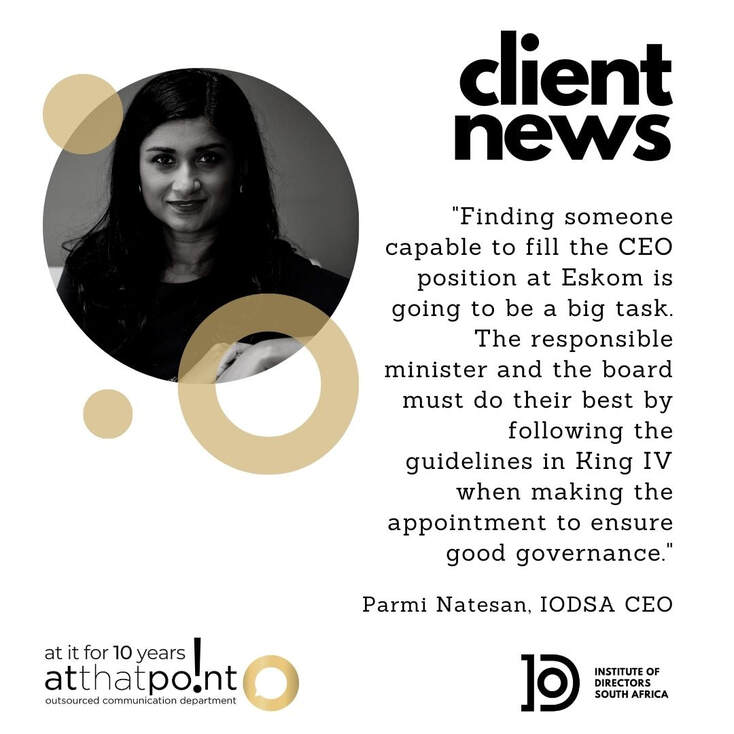 The current crisis at Eskom has a number of governance lessons for South Africa, one of which is the vital importance of proper succession planning for key senior positions, says Parmi Natesan, CEO of the Institute of Directors in South Africa (IoDSA). “The imminent departure of both the CEO and COO of Eskom in the next few months, with no obvious successors being communicated, raises concerns,” she says. “Now is really not the time for the two top positions—and many other senior management ones—to be vacant. In fact, Ms Natesan continues, the Eskom Statement on 14 December 2022 makes it clear that Mr De Ruyter’s agreement to stay on beyond the required 30-day notice period is welcome because there seems to be no planned successor for his position. The statement quotes the board chair as follows: “Mr De Ruyter has agreed to stay for an additional period beyond the stipulated 30-days’ notice to ensure continuity while we urgently embark on a search for his successor”. It remains to be seen whether there are plans in place for a succession to the COO, Jan Oberholzer, who is due to retire in April—a month after Mr De Ruyter leaves—and it is also unclear as to whether he will remain available to hand-over to a successor when one is appointed. King IV specifically states that the board should satisfy itself that there is succession planning for the CEO and other executive positions in place to provide continuity of executive leadership. Succession planning should be reviewed periodically and should provide for both succession in emergency situations and succession over the longer term. This should include the identification, mentorship and development of future candidates. The IoDSA has repeatedly said that the way the CEOs of key state-owned enterprises have been appointed were not in line with good governance as outlined in King IV. Too often, the powerful single shareholder bypasses the board in making the appointment. This leads to problems because the CEO is seen as a representative of the shareholder, and thus sometimes does not feel accountable to the board. Skewed reporting lines set the board and executive management up for conflict, with bad results for the organisation. “Finding someone capable to fill the CEO position at Eskom is going to be a big task. The responsible minister and the board must do their best by following the guidelines in King IV when making the appointment to ensure good governance,” she concludes. “Good governance is the foundation of good organisational performance—and the converse is also true.” ENDS MEDIA CONTACT: Stephné du Toit, [email protected], 084 587 9933, www.atthatpoint.co.za For more information on the IoDSA please visit: Website: www.iodsa.co.za Twitter: @The_IoDSA LinkedIn: Institute of Directors South Africa Company Page Facebook: Institute of Directors South Africa 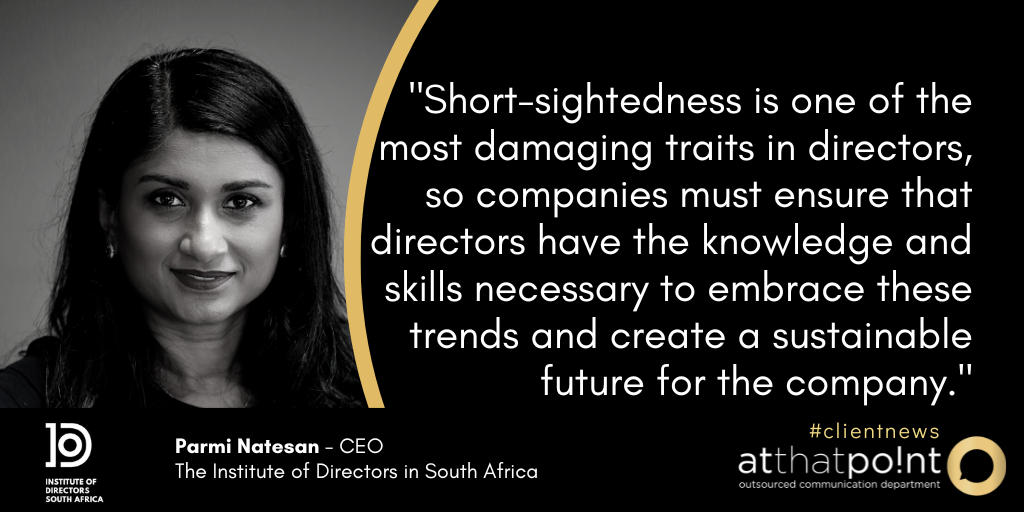 The Institute of Directors in South Africa (IoDSA) lays out five key trends for boards and directors to focus on in 2023. Parmi Natesan, CEO of the IoDSA argues that boards need to begin planning their agendas for 2023 to ensure they are on top of these trends—and that their members have the requisite skills to fulfil their duties. “Short-sightedness is one of the most damaging traits in directors, so companies must ensure that directors have the knowledge and skills necessary to embrace these trends and create a sustainable future for the company,” she says. The five disruptive trends are: Less time, more pressure. Businesses have to respond fast to a rapidly changing global environment that is increasingly automated - directors are under increasing pressure to take important decisions rapidly. The chair’s role becomes even more critical in striking a balance between facilitating an inclusive exchange of views while preventing unprepared directors or individual agendas to hijack or prolong the board’s deliberations. By the same token, directors must be properly prepared to make decisions on agenda items. Less paper, more AI. Boards will specifically need to acquire the skills to interpret real-time data accurately in order to incorporate it into their decision-making process. They can no longer simply base their deliberations on the board pack but will need to ensure that artificial intelligence (AI) is effectively used to process large amounts of data to deliver relevant insights. In a similar vein, directors will need to allocate resources to streamline business processes within the company using AI and other Fourth Industrial Revolution technologies. Less focus on operational issues, more oversight. The traditional view that extensive operational or managerial experience makes for a good director must now be discarded once and for all—directors need a distinct knowledge base and skill set. “Continuing learning is vital. The IoDSA’s advice is to plan training topics into the meeting calendar for the year and, if necessary, integrate training sessions into the board’s or committee’s meeting agenda,” Ms Natesan says. “The IoDSA can help by providing this phased and structured learning via two-hour snapshot training sessions.” Less stability, more agility. Today’s world is volatile, uncertain, complex and ambiguous (VUCA), with economic and geopolitical issues more intertwined and harder to interpret than ever. Long and complex supply chains also expose companies to contingent risks and thus require extensive planning to ensure alternatives are in place. In this VUCA world, the ability to respond rapidly and strategically is critical. Less greed, more green. Environmental issues, including but not limited to climate change, should be prominent on the board agenda for a multitude of reasons. Directors need to have the skills not only to understand these complex issues but also how to measure and report credibly on the company’s progress in meeting its environmental targets. ENDS MEDIA CONTACT: Stephné du Toit, [email protected], 084 587 9933, www.atthatpoint.co.za For more information on the IoDSA please visit: Website: www.iodsa.co.za Twitter: @The_IoDSA LinkedIn: Institute of Directors South Africa Company Page Facebook: Institute of Directors South Africa |
Archives
July 2024
Categories
All
|

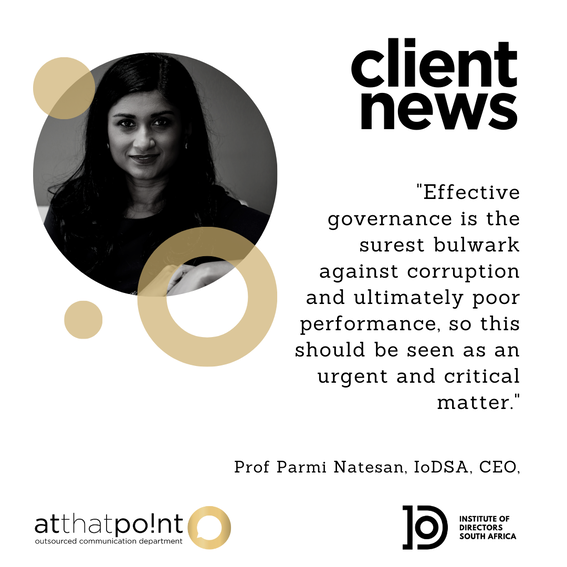
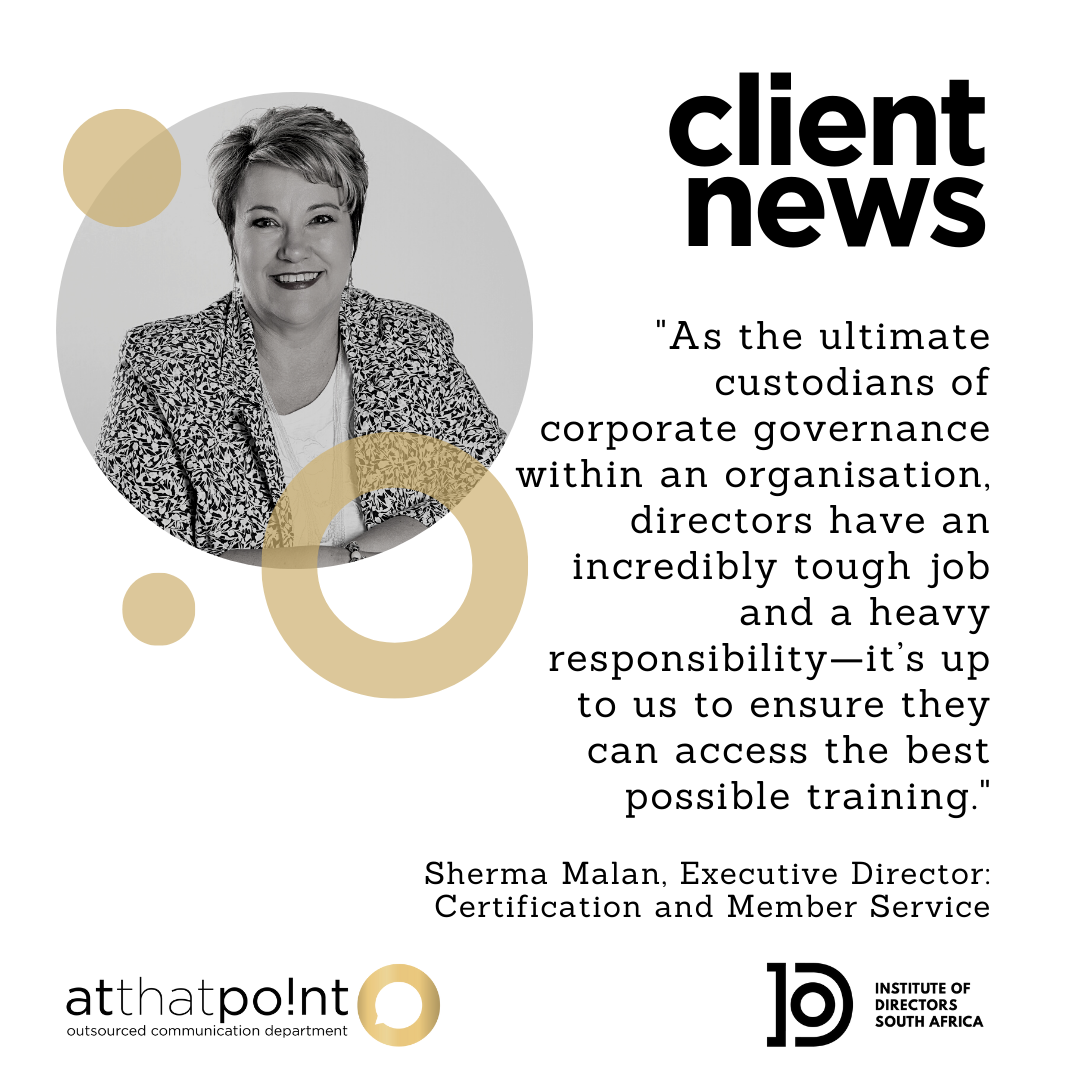
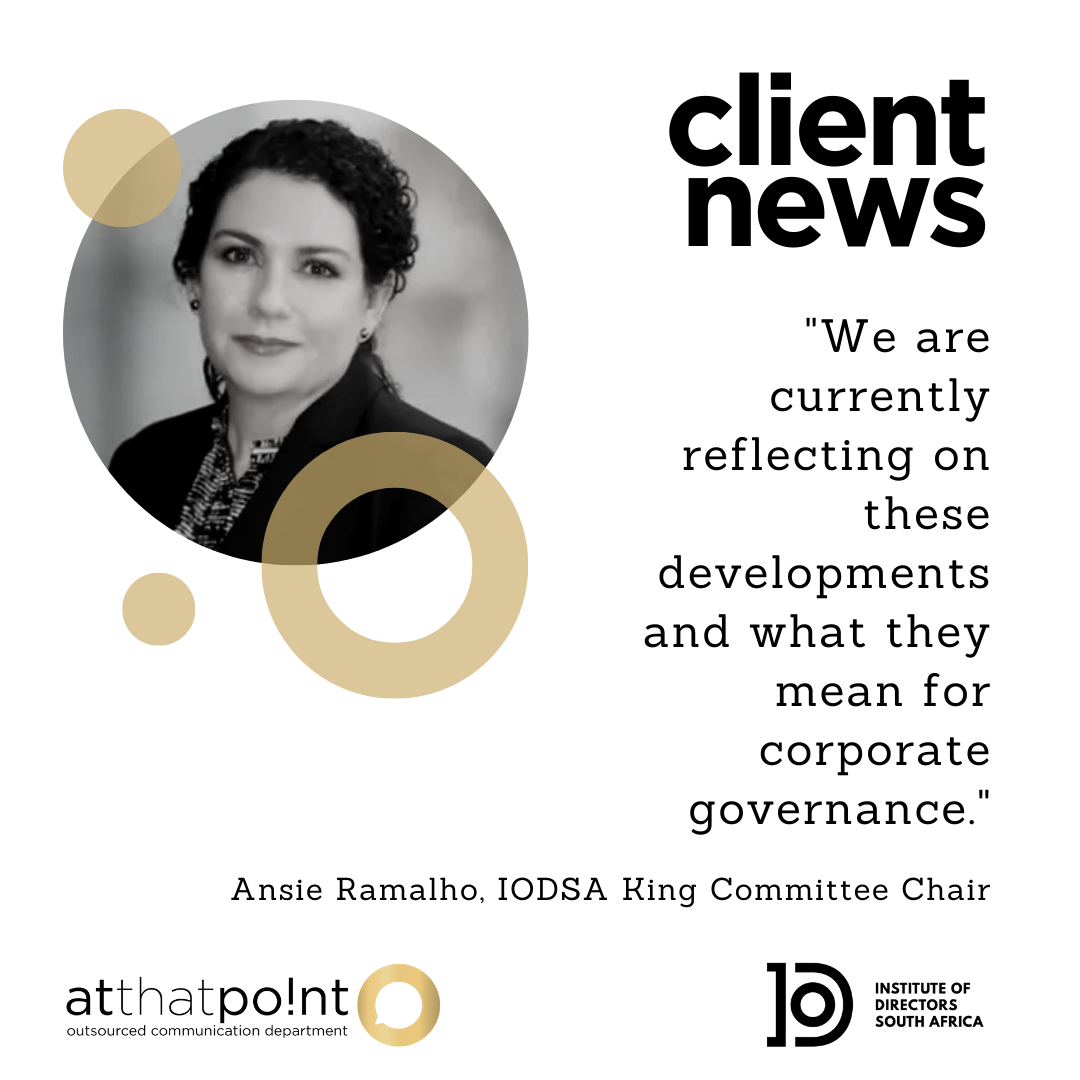
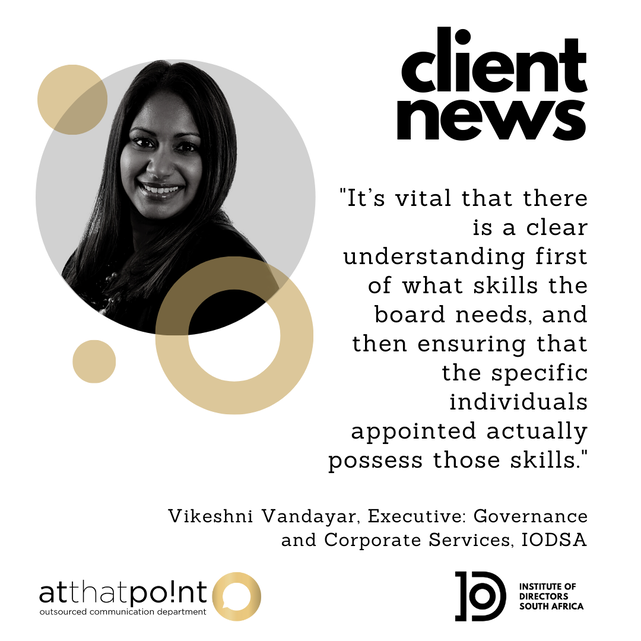
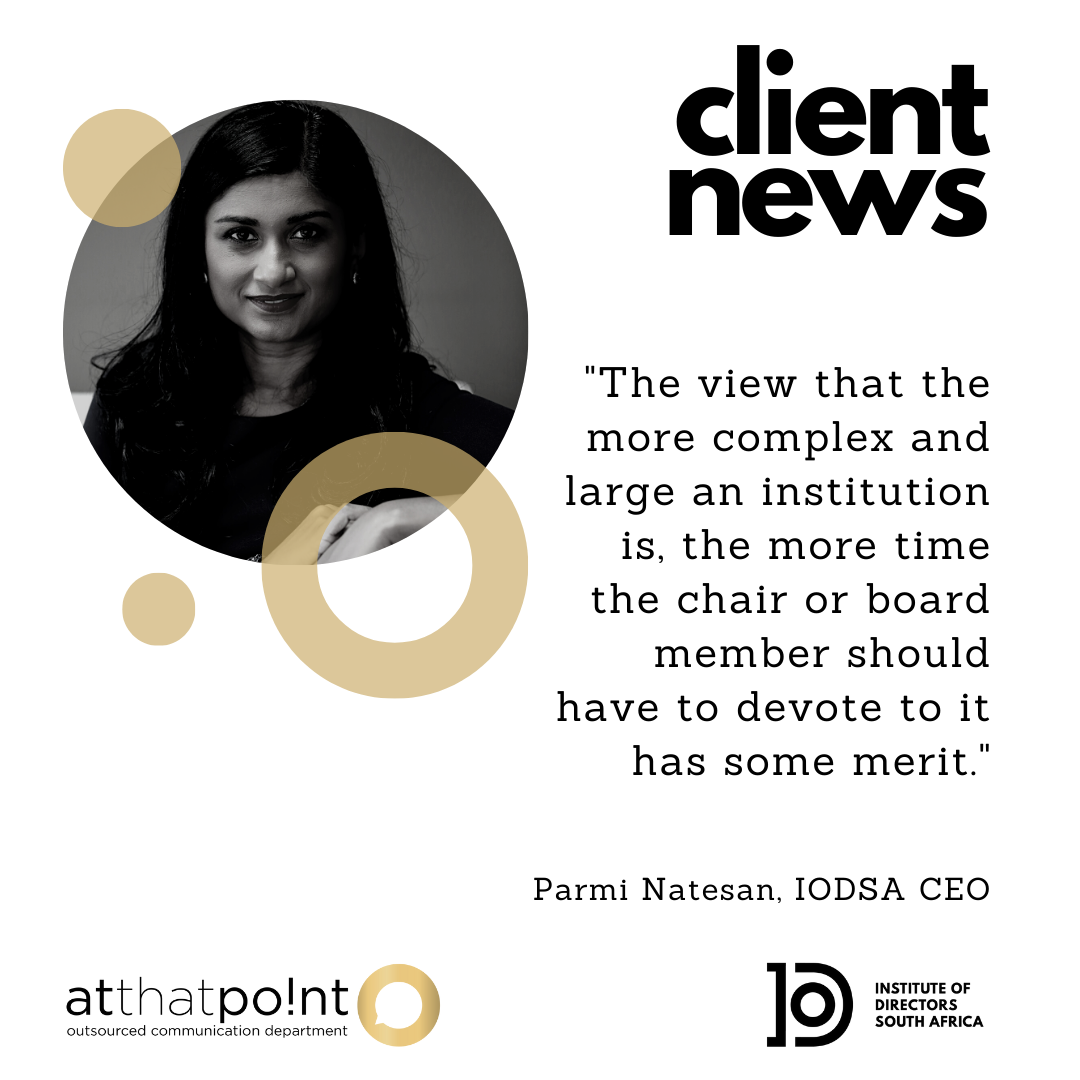
 RSS Feed
RSS Feed